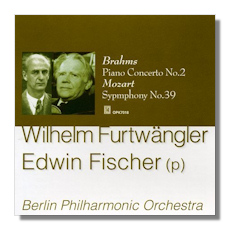
The Internet's Premier Classical Music Source
Related Links
-
Brahms Reviews
Mozart Reviews - Latest Reviews
- More Reviews
-
By Composer
-
Collections
DVD & Blu-ray
Books
Concert Reviews
Articles/Interviews
Software
Audio
Search Amazon
Recommended Links
Site News
 CD Review
CD Review
Furtwängler Conducts

- Wolfgang Mozart: Symphony #39 in E Flat Major, K. 543
- Johannes Brahms: Piano Concerto #2 in B Flat Major, Op. 83
Edwin Fischer, piano
Berlin Philharmonic Orchestra/Wilhelm Furtwängler
Opus Kura OPK7018
The recorded sound for both performances is surprisingly full while also being quite harsh in louder moments. Opus Kura is distributed both in the United Kingdom and the United States; Albany Music Distribution handles the Japanese label here. While the sound is not the label's very best work, the performances are excellent. I've written at length about Furtwängler's erratic discography, but recently I have come to appreciate him a good deal more.
The Mozart is far better than I initially expected. This is hardly historically informed, but it's not droopy, either. The Berlin Philharmonic Orchestra also plays perfectly well considering than this was 1941. Even the Andante – which I feared would be a heavy dirge – flows beautifully with some real dramatic tension. The sound turns rather ugly here, and I don't know if that stems from the live setting, or from the fact that Opus Kura inexplicably chose Melodiya LPs for the transfers. Still, there are moments of genuine beauty and a great deal more subtlety than the conductor generally gets credit for. It's not all perfect, because despite obvious enthusiasm the Menuetto is a touch stiff, and the Finale is a bit too serious. Still, better this than sloppy; compare this to the same forces in Brahms' Symphonies, and this is audibly superior.
The Brahms Concerto with Edwin Fischer is a great performance 70 years after being set down. Soloist and conductor prove an outstanding team, with the Berlin Philharmonic at its most responsive and controlled. Furtwängler may have been uneven on the podium, but I generally find that with soloists (whether in the concert hall or opera house) his musicality was best expressed. The tone of the piano will not be to all tastes, but again I am guessing that this is more about the recording transfer as opposed to the age of the performance. I've not heard the Testament release with this same rendition, but I would be willing to wager that issue is probably somewhat superior to this one sonically. Still, the tension and dramatic sweep of Fischer's conception cannot be ignored, nor can the Berlin Philharmonic be discounted. The war years were hardly kind to this ensemble, and there is no shortage of bad recordings from London, Berlin, and Vienna around this time period. However, this was clearly one of the artistic highpoints of the era. Collectors with an interest in historical piano recordings may already own this classic, but newcomers should hear this.
Copyright © 2015, Brian Wigman





















